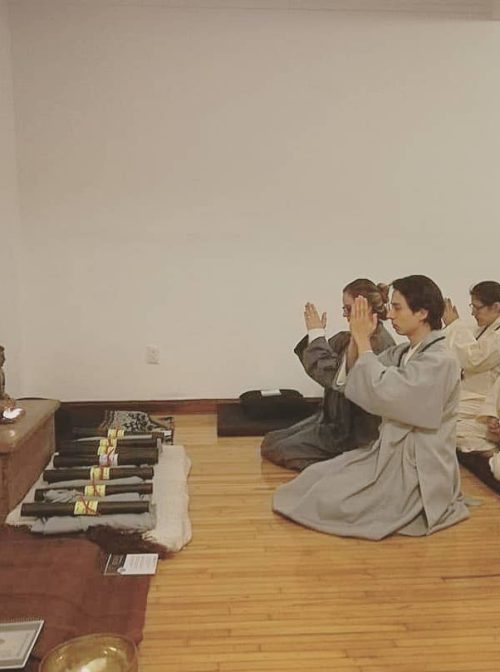Muchas personas interesadas en el diálogo interreligioso hablan diversos idiomas aparte del inglés. Vasu Bandhu es un líder interreligioso en Arizona. Vasu Bandhu trabaja para asegurar que la diversidad de idiomas sean un puente, no un obstáculo, para conectar la diversidad religiosa. Aqui hay una conversación en español con Vasu Bandhu y Jeff Pinzino de Interfaith America, con traducción en inglés.
Many people who are interested in interfaith dialogue speak languages other than English. Vasu Bandhu is an interfaith leader in Arizona at the Arizona Faith Network and is working to ensure that language diversity is a bridge, not an obstacle, to connecting across religious diversity. Here is a conversation in Spanish with Vasu Bandhu and Jeff Pinzino of Interfaith America, with translation in English.
This conversation was lightly edited for length and clarity. The conversation below is in Spanish with an English translation to follow.
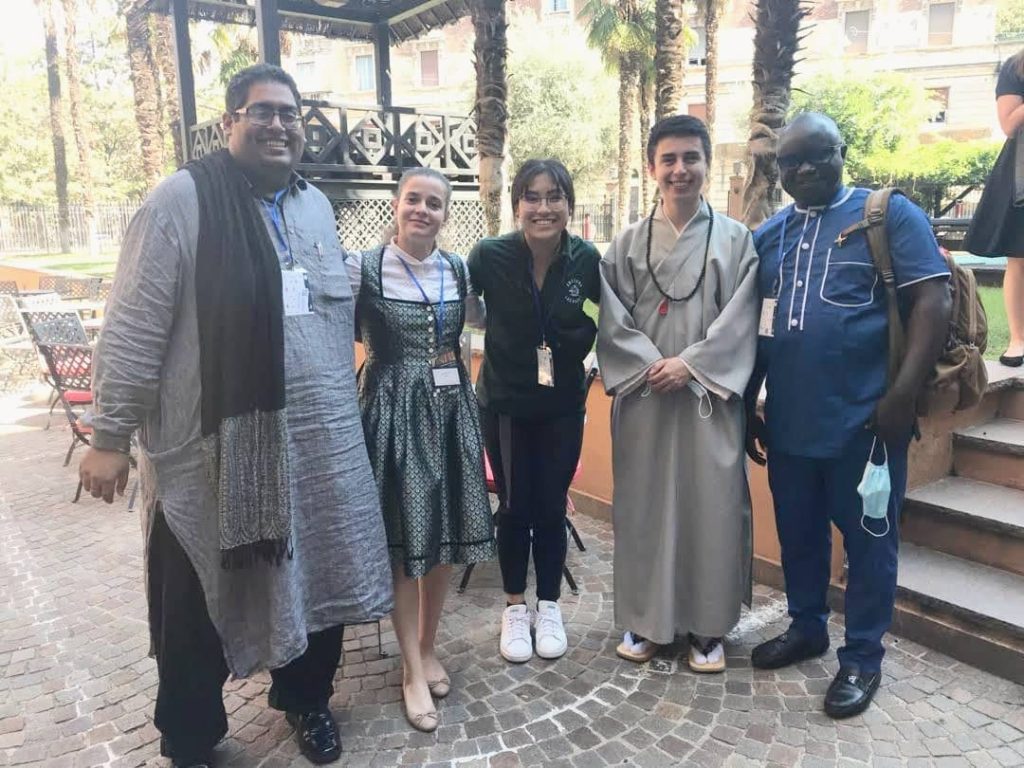
Jeff Pinzino: Hoy yo estoy super alegre de hablar contigo en español de de tu proceso con el dialogo interreligiosa. Quizás para empezar, tú quieres decirme un poco de tu historia de cómo se involucró en interfé?
Vasu Bandhu: Claro que sí, Jeff. Muchas gracias por esta oportunidad. Estoy muy feliz de estar hoy contigo. Y entonces yo conocí Interfé en El Salvador, Centroamérica, durante mi colaboración con Religiones por la Paz en El Salvador y trabajando con líderes religiosos de Religiones por la Paz. Y ahora estoy aquí en Estados Unidos, trabajando para Arizona Faith Network.
JP: Qué bueno. Y dime, ¿Qué significa el fe y el interfé en el Salvador? ¿Es común este este tipo de conversación dentro de diferentes tradiciones? ¿O es algo algo más raro?
VB: Claro. El diálogo interreligioso ha sido muy importante para el país, para El Salvador, porque ha permitido crear paz durante la Guerra Civil, por ejemplo. Líderes religiosos de diversas religiones en El Salvador promueven el diálogo para crear procesos de paz.
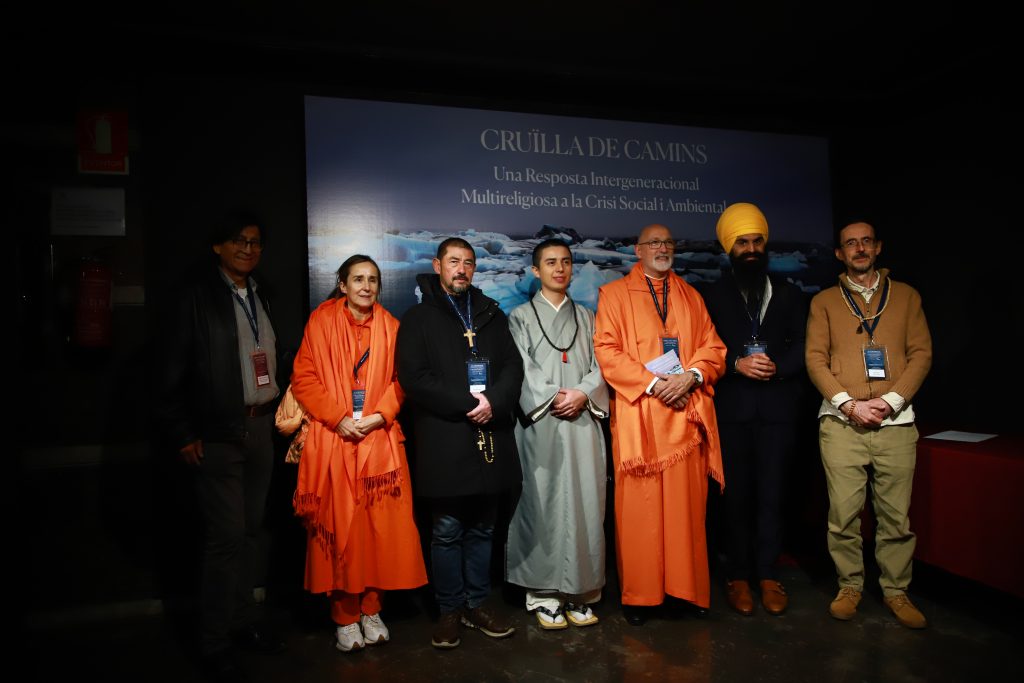
JP: ¿Y el país de El Salvador es muy católica? ¿Cuáles son las religiones comunes allá?
VB: El mayor por ciento de la población son cristianos en general y específicamente cristianos evangélicos. Entonces tenemos minorídades también católicas y de otras religiones.
JP: ¿Y tú encontraste el budismo en El Salvador?
VB: Sí, lo encontré. Conocí el budismo en El Salvador por medio de Religiones por la Paz, porque visitábamos las diversas comunidades y religiones. Y yo visité el Centro Budista en El Salvador y conocí el budismo.
JP: ¿Y cuál fue interesante sobre esa religion? ¿Que fue para ti interesante para investigar más?
VB: Me conectó mucho la meditación. Practicar meditación para desarrollar conciencia y atención plena. Entonces yo me sentí muy conectado con el budismo.
JP: ¿Tuviste alguna instrucción en otra religión antes?
VB: Toda mi familia son cristianos de diversas iglesias, algunos son de la Iglesia Católica y mi mamá actualmente practica con la Iglesia de Jesucristo de los Santos de los Últimos Días.
JP:¿Y como decidiste mudarse a los Estados Unidos?
VB: Durante diversos encuentros interreligiosos, conocí a quien ahora es mi esposo. El practica Islam es musulmán y nos conocimos por medio del diálogo interreligioso. Él es de Estados Unidos. Entonces decidimos vivir aquí en Estados Unidos para vivir cerca de la familia. Entonces, a partir del diálogo interreligioso encontramos la conexión y encontramos esa oportunidad para ser una familia también.
JP: ¿Y entonces este diálogo interreligioso es algo que en una conferencia, por ejemplo, o es algo que hablas durante la cena también?
VB: Es verdad tenemos esta conversación todo el tiempo porque practicamos diferentes religiones y tenemos diferentes formas de ver la vida completamente diferentes a veces, pero lo platicamos todo el tiempo. Es algo que una conversación que existe todo el tiempo en nosotros.
JP: Y dime un poco de los proyectos en que estás involucrado ahora.
VB: Yo trabajo con Arizona Faith Network ayudando a la coordinación de las comunidades de fe para poder conectados con los diversos programas que tiene Arizona Faith Network. Parte de esos programas es por el medio ambiente, por los derechos del voto, por la justicia social, por el cambio y la reforma del sistema penal en los Estados Unidos. Y también aparte de esto, trabajo con Religiones por la Paz, para poder ayudar con la interpretación de idiomas y también ayudó a la Iniciativa de Religiones Unidas para también conectar las personas que hablan diversos idiomas. Parte de mi trabajo es conectar a las personas que hablan diversos idiomas para poder facilitarme por la comunicación.
JP: ¿Es es el diálogo interreligioso en español diferente del diálogo interreligioso en inglés? ¿Cómo? ¿Cómo siente diferente?
VB: Sí, puedo ver muchas diferencias porque cada idioma tenemos conceptos muy específicos y cuando por ejemplo decimos “interfaith” en inglés, tiene una presentación y un contexto etimológico muy específico. Cuando nosotros nos referimos al “diálogo interreligioso” en español también es muy específico. Pero cuando yo trabajo para interpretar las conversaciones también es algo muy bonito, porque aprendemos de las diversas formas de ver la vida que cada idioma tiene. Creo que el diálogo interreligioso también nos conecta con los diversos idiomas y es también parte de esa diversidad que tenemos de ver la vida y de creer.
JP: Hay muchos hispanohablantes aquí en los Estados Unidos. ¿Hay más personas que están participando en estos diálogos en español también?
VB: Sí, estamos trabajando mucho por esto, para que la comunidad inmigrante latina participe más en las conversaciones que tenemos aquí en los Estados Unidos. Porque, como tú dices, tenemos personas que hablan diversos idiomas. Español, pero también personas que hablan otros idiomas en los Estados Unidos. Y también puedo ver una hermosa oportunidad que incluimos todas las diversidades, la diversidad de los idiomas, creando conversaciones multilingües y con tecnología. Es posible tener conversaciones multilingües donde personas de diversos idiomas se comunican, se conocen y conectan con sus fes y con sus corazones. Existen nuestras comunidades latinas en Argentina que participan muy activamente de la comunidad indígena y específicamente de nuestra querida hermana Rosalía, quien es parte de la comunidad de URI. Ella ha podido participar activamente en todas las reuniones globales y siempre tiene la oportunidad de hablar, de comunicar, de compartir sus experiencias. Cuando las personas de diversos idiomas tienen las mismas oportunidades, nosotros podemos crear una vida más armónica. Cuando hablamos del diálogo interreligioso, tenemos diferencias de las creencias y encontramos puntos para la paz. Y también los idiomas. A veces tienen sus diferencias y también sus propias y únicas cosmovisiones. Pero cuando conectamos, creamos paz.
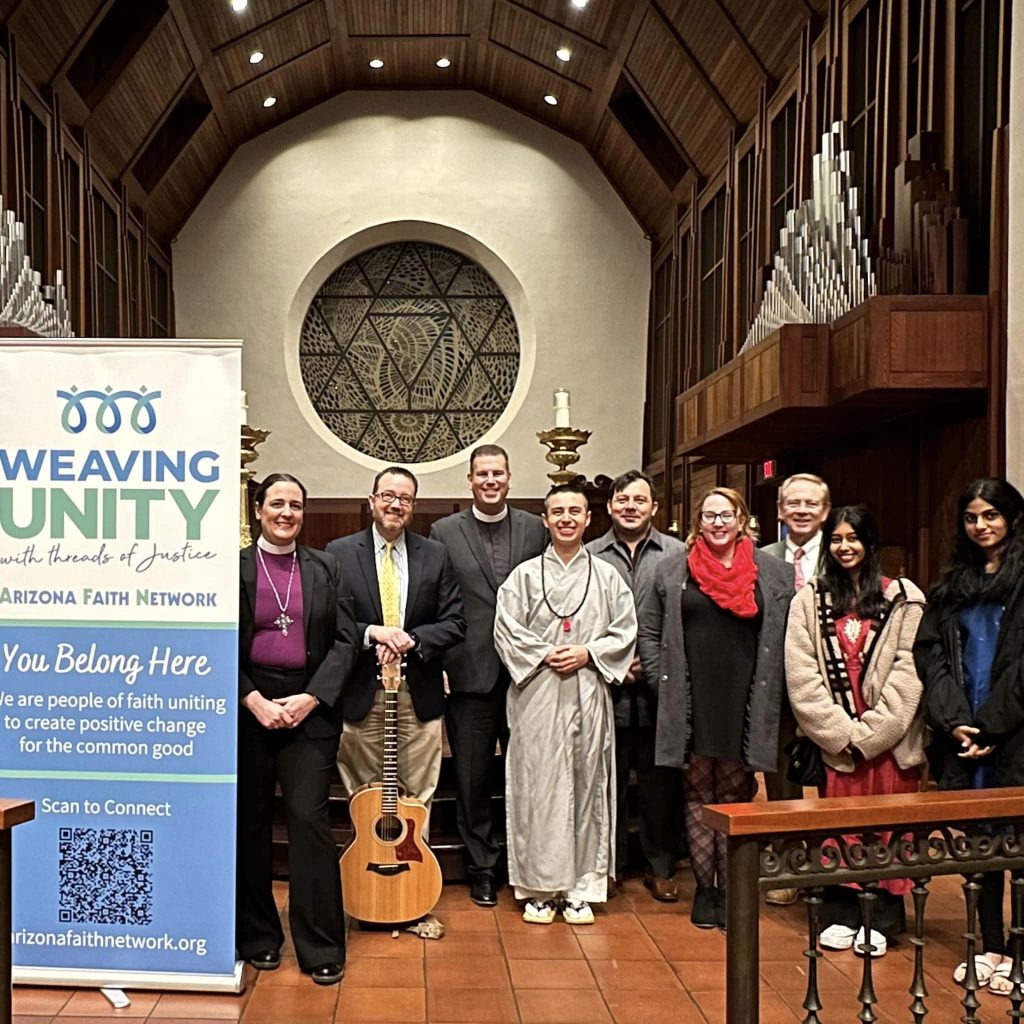
The conversation translated to English:
Jeff Pinzino: Today I am very happy to speak with you in Spanish about your process with interreligious dialogue. Maybe to start with, can you tell me a little of your story of how you got involved in interfaith?
Vasu Bandhu: Sure, Jeff. Thank you for this opportunity. I am very happy to be with you today. I came to know interfaith in El Salvador, Central America, during my collaboration with Religions for Peace in El Salvador and working with religious leaders of Religions for Peace. And now I’m here in the United States, working for the Arizona Faith Network.
JP: That’s great. Tell me, what does faith and interfaith in El Salvador mean? Is this type of conversation common within different traditions? Or is it something more rare?
VB: Interreligious dialogue has been very important for the country, for El Salvador, because it has made it possible to create peace during the Civil War, for example. Religious leaders of various religions in El Salvador promote dialogue to create peace processes.
JP: Is El Salvador very Catholic? What are the common religions there?
VB: The largest percent of the population are Christians in general and Evangelical Christians specifically. We also have Catholic minorities and other religions.
JP: And you found Buddhism in El Salvador?
VB: Yes. I got to know Buddhism in El Salvador through Religions for Peace, because we visited different religious communities. I visited the Buddhist Center in El Salvador and learned about Buddhism.
JP: And what was interesting about that religion that made you want to investigate further?
VB: Mediation connected deeply with me – practicing meditation to develop awareness and mindfulness. So I felt very connected to Buddhism.
JP: Did you have any instruction in another religion before?
VB: My whole family are Christians from various churches, some are from the Catholic Church and my mom currently practices with the Church of Jesus Christ of Latter Day Saints.
JP: How did you decide to move to the United States?
VB: During various interfaith gatherings, I met the man who is now my husband. He practices Islam, he is Muslim, and we met through interreligious dialogue. He is from the United States. So we decided to live here in the United States to be close to his family. So through interfaith dialogue we found a connection to each other, and we found the opportunity to be a family as well.
JP: And so is interfaith dialogue something you two only do at conferences, for example, or is it something you talk about over dinner too?
VB: It’s true we have this conversation all the time because we practice different religions and have completely different ways of looking at life sometimes, but we talk about it all the time. It is a conversation that is always happening between us.
JP: Talk a little about the interfaith projects you’re currently involved in.
VB: I work with Arizona Faith Network helping to connect faith communities with the various programs that we have. Part of these programs are for the environment, for voting rights, for social justice, for change and reform of the penal system in the United States. Apart from this, I work with Religions for Peace, helping with language interpretation and I also helped the United Religions initiative to connect people who speak different languages. Part of my job is to connect people who speak different languages in order to facilitate communication.
JP: Is interreligious dialogue in Spanish different from interreligious dialogue in English. How? How does it feel different?
VB: Yes, I can see many differences because each language has very specific concepts and when for example we say “interfaith” in English, it has a very specific etymological context and presentation. When we refer to “diálogo interreligioso” in Spanish, it is also very specific. When I work to interpret conversations, we learn from the different ways of seeing life that each language has. I believe that interreligious dialogue also connects us with each other through the different languages, and it is also part of that diversity that we have to see life and to believe.
JP: There are many Spanish speakers here in the United States. Are there more people who are participating in these dialogues in Spanish as well?
VB: Yeah, we’re working hard on this, to get the Latino immigrant community more involved in the conversations that we have here in the United States. We have people who speak Spanish, but also people who speak other languages in the United States. There’s a beautiful opportunity for us to include different kinds of diversity, the diversity of languages, creating multilingual conversations and with technology. It is possible to have multilingual conversations where people of different languages communicate, meet and connect with their faiths and their hearts. In Argentina there are people from the indigenous communities that participate very actively, and specifically our dear sister Rosalía, who is part of the United Religions Initiative (URI) community. She has been able to actively participate in all the global meetings and she always has the opportunity to speak, to communicate, and to share her experiences. When people of different languages have the same opportunities, we can create a more harmonious life. When we talk about interreligious dialogue, we have differences of beliefs and find points for peace. Similarly with the different languages. Sometimes they have their differences and also their own unique worldviews. But when we connect, we create peace.
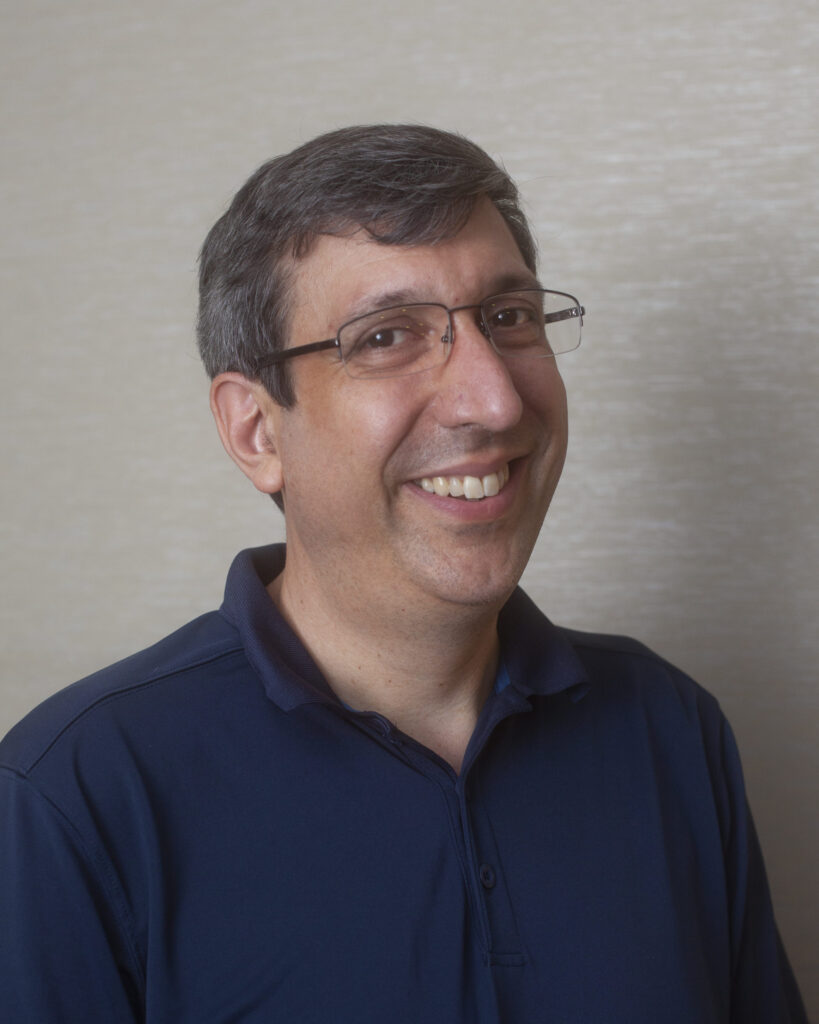
For the past two decades, Jeff Pinzino has helped to make visionary social change projects real. Whether developing a mobile market to bring fresh produce to food deserts or co-founding a housing co-op for activists, he has brought creativity, expertise, and resourcefulness to bear in creating social change. Jeff has professional experience in community organizing, social entrepreneurship, philanthropy, fundraising, management and training. He has a passion for projects committed to economic justice and racial equity, especially those that engage human creativity and connectedness to transform communities. Some of his previous titles include Sr. Director of Development, External Relations of the Illinois Coalition for Immigrant and Refugee Rights, Development Director of New Orleans Works Center for Racial Justice, and Chief Operating Officer of Resilience Force.
